Recent Achievements of the UT Dallas Computer Science Faculty
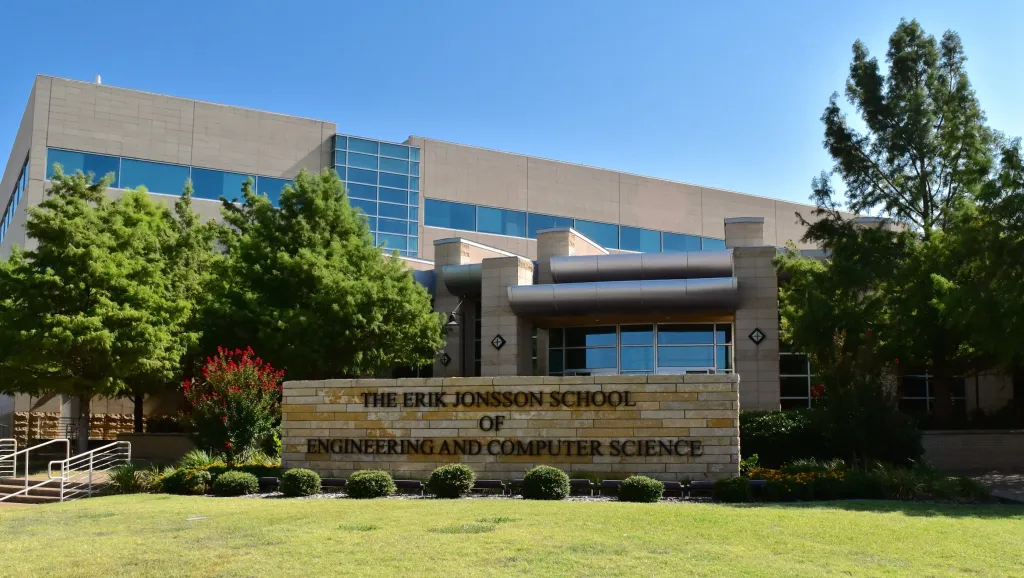
The UT Dallas Computer Science Department houses 86 accomplished faculty members with multifaceted talents, each of whom have distinguished themselves in their individual field. Twelve CS faculty members have earned the National Science Foundation’s CAREER award, many of them hold professorial chairs, several of them serve as journal editors, and numerous faculty members are recipients of prestigious awards and grants such as the Air Force Office of Scientific Research (AFOSR) grants and Google Faculty Research grants.
UT Dallas Computer Science faculty members have published numerous papers in top conferences such as Association for the Advancement in Artificial Intelligence (AAAI)/International Joint Conference on Artificial Intelligence (IJCAI), Association for Computational Linguistics (ACL), Uncertainty in Artificial Intelligence (UAI), Neural Information Processing Systems (NIPS)(Intelligent Systems Group), Network and Distributed System Security (NDSS), Annual Computer Security Applications Conference (ACSAC), Usenix Security, Computer and Communications Security (CCS)(Cyber Security), GlobeCOM, InfoCom, and many more.
Some of the recent achievements of a few of our faculty members are highlighted below.
Professor Eric Wong, Director of the Advanced Research Center for Software Testing and Quality Assurance in Computer Science at UT Dallas, gave a keynote speech at the 18th International Conference on Formal Engineering Methods (ICFEM 2016), which was held in Tokyo, Japan from November 14th to the 18th. The conference provides a forum for researchers and practitioners who are interested in developing formal methods for software engineering or applying existing formal techniques to improve software development process in practice.
The focus of Professor Wong’s keynote was on “Combinatorial Testing and Its Applications,” which is based on an ongoing project sponsored by the National Institute of Standards and Technology (NIST) − an agency of US Department of Commerce and the CEPREI Laboratory in China. During the talk, Professor Wong emphasized that studies have shown how combinatorial testing can help programs detect hard-to-find software bugs that may not be revealed by test cases generated using other testing techniques. The first part of his talk was about traditional black-box requirements-based combinatorial testing. In particular, Professor Wong discussed results and lessons learned from two real-life industry applications: a control panel of a railroad system and a Linux system. The second part extended the concept of combinatorial testing to a white-box structure-based setting. Professor Wong presented an advanced coverage criterion, Combinatorial Decision Coverage, in conjunction with symbolic execution to achieve high coverage cost-effectively without suffering from potential space exploration. Professor Wong also explained how combinatorial testing could be applied to a graph-based methodology for testing IoT (Internet of Things).
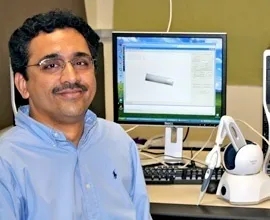
Last year, Dr. Dr. Balakrishnan Prabhakaran was awarded the 2015 Best Associate Editor Award for his work with the Multimedia Systems Journal. The Multimedia Systems Journal is the first journal within the field of multimedia systems, dating back more than two decades (more info here). The role of Associate Editor is to evaluate the merits of submitted research papers by having them reviewed by peer reviewers, while ensuring each paper is considered for publication in a fair manner. The award is based on the number of research papers handled by an associate editor in a year, timeliness, as well as quality of the decisions made. Through his role as Multimedia Systems Journal Associate Editor, Dr. Prabhakaran brought in several new reviewers to the journal while ensuring that quality decisions were made. The award provides peer recognition for the associate editor within the multimedia systems research community.
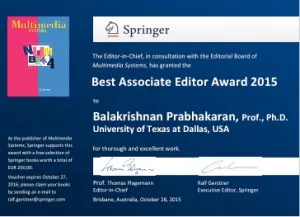
“It has been both a honor and pleasure to serve the multimedia research community by being an Associate Editor for the Multimedia Systems Journal,” notes Dr. Balakrishnan Prabhakaran
Dr. Zygmunt Haas, UT Dallas Professor, Distinguished Chair in Computer Science, the director of the Wireless Networks Laboratory (WNL) at Cornell University, presented a Keynote Speech at The Fourth Institute of Electrical and Electronic Engineers (IEEE) Annual International Workshop on Mission-Oriented Wireless Sensor Networking (IEEE MiSeNet 2015), where he was the chair of the organizing committee. The workshop was part of the IEEE MASS 2015, the 12th IEEE International Conference on Mobile Ad hoc and Sensor Systems conference, and was held in Dallas on October 19, 2015. The keynote was entitled “Challenges of the Internet of Things.” During the talk, Dr. Haas presented a comprehensive view of the Internet of Things (IoT) and related technologies, their benefits, and possible roadblocks, while emphasizing issues surrounding security and privacy as the key obstacles to proliferation of IoT technology. IEEE MiSeNet 2016 aims to provide a forum for participants from academia and industry to discuss topics in mission-oriented WSNs research and practice. IEEE MiSeNet 2016 serves as incubator for scientific communities that share a particular research agenda in the area of mission-oriented WSNs.
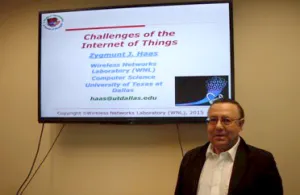
During February of this year, Dr. Mark Paulk was appointed the 2016 Vice President of the Standards Activities Board for the IEEE Computer Society. As Vice President of the Standards Activities board Dr. Paulk is responsible for helping develop new standards for emerging technology in areas such as autonomous vehicles, 3D printing, Big Data, Cyber Security and privacy, creating a professional education portfolio to improve awareness and understanding of standards, and encouraging the use of standards by both suppliers and customers of computer systems. Standards developed under the IEEE Computer Society range from process standards related to Software & Systems Engineering to product standards for networking under IEEE 802 to emerging technologies such as Cloud Computing. (Read more here)
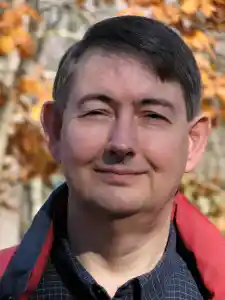
Drs. Hal Sudborough, Linda Morales, and Sergey Bereg jointly authored a research paper entitled “Extending Permutation Arrays: Improving MOLS Bounds,” which was recently accepted for publication in the Designs, Codes, and Cryptography International Journal. In this paper Drs. Sudoburough, Morales, and Bereg introduced a new technique called partition and extension, which tries to find the biggest Hamming Distance Possible for a given number of symbols using this new mathematical technique.
Dr. Sudoburough explains the technique saying “Our techniques show how to improve lower bounds on the size of permutation arrays on n symbols with Hamming distance n-1, where n is one larger than a power of a prime, as well as many other cases. Specifically, we prove a theorem showing a 1/2(n^(1.5)-O(n) lower bound on the size of permutation arrays on n symbols with Hamming distance n-1, where n is one larger than a power of a prime.” This result is of great significance, as proving a lower bound of an algorithm is incredibly hard.
Assisting Drs. Bereg, Sudoburough, and Morales were UT Dallas Computer Science undergraduate students, Shiva Sharma, Amber Hasan, and Nikoli Cartegena. The students created a program to compute the elements of various Galois fields and the addition and multiplication tables. Their work assisted in the main project, which is improving what is known about permutation arrays with Hamming distance constraints.
ABOUT THE UT DALLAS COMPUTER SCIENCE DEPARTMENT
The UT Dallas Computer Science program is one of the largest Computer Science departments in the United States with over 1,600 bachelor’s-degree students, more than 1,100 master’s students, 160 PhD students, and 80 faculty members, as of Fall 2015. With The University of Texas at Dallas’ unique history of starting as a graduate institution first, the CS Department is built on a legacy of valuing innovative research and providing advanced training for software engineers and computer scientists.




